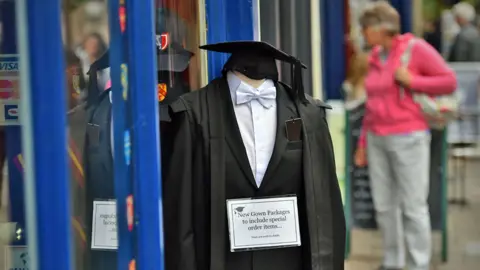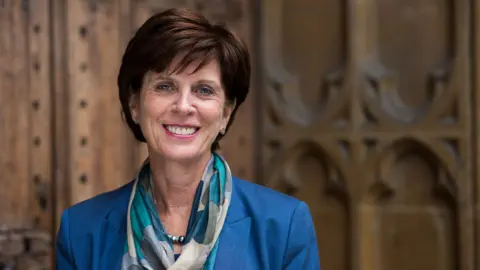Record ethnic minority students at Oxford
 Getty Images
Getty ImagesOxford University's latest admissions figures show the highest ever proportion of places for ethnic minority students - at 18%.
There were also rising numbers of state school pupils, up to about 61%.
But the figures, for undergraduate entry in autumn 2018, showed more places taken by students from Singapore than from the north-east of England.
Vice-chancellor Louise Richardson said a "sea change" in admissions would "accelerate the pace of change".
Last month, Oxford University announced a target for a quarter of its UK students to come from disadvantaged backgrounds by 2023.
The university's push for a more diverse intake followed accusations that it was socially exclusive.
This detailed breakdown on admissions also highlights different trends below the headline figures - such as Asian students being much more likely to get places than other minorities.
Tougher competition
The admissions statistics show a widening of access, but also an intensification of competition.
Applications have increased significantly, up by almost a quarter in four years, with 21,000 applications for about 3,300 places.
 Getty Images
Getty ImagesThere is rising competition at home and abroad and the proportion of places going to UK students has continued to slip downwards - about 78% this year, compared with 82% four years previously.
The BBC showed earlier this year that UK student numbers at Oxford and Cambridge had fallen by more than a thousand compared with a decade ago.
Among students from overseas, China and Singapore have the biggest number of places.
The 320 students from China and 206 from Singapore compare with the 159 places for students from the north-east of England and 217 from Wales, in three-year figures for 2016 to 2018.
There were more than 3,800 places for students from London and the south-east of England, across these years - which were also the places with the highest concentrations of students with top grades.
A university spokesman said: "Every student at Oxford is chosen based on academic ability and potential alone" and that higher fees for overseas students were not a factor.
State school entry
The proportion of state school pupils getting places is at its highest in records going back about 40 years.
Among UK entrants, it has gone up from 56.3% to 60.5% over the past four years - and this translates to about 80 more places for state-educated pupils and about 120 fewer places for privately educated ones.
 Getty Images
Getty ImagesAbout 18% of students taking A-levels are in private schools, so they remain significantly over-represented.
There are big differences by subject. Among those studying maths, 73% are from state schools, but for classics it is only 29%.
'Few black students'
This year's intake saw 18.3% of places taken by ethnic minority students - the highest proportion on record.
Applications from ethnic minority students have been increasing rapidly - up by almost half in four years.
The university highlights the rise in applications and admissions for Asian students. Among the UK intake, 8.3% are from an Asian background, compared with 2.6% for black African and Caribbean students.

Despite the numbers of black students rising, it means that over three years there was only one UK black student admitted for geography, two for physics and none for biological sciences.
In 12 of Oxford's colleges, fewer than five black students had been recruited over three years. No college had recruited fewer than 12 Asian students or 120 white students across this time.
The proportion of deprived pupils has moved upwards, with 11.3% of places going to students classified as facing socio-economic disadvantage.
Prof Richardson, the university's vice-chancellor, said the intake still "reflects the deep inequalities in our society along socio-economic, regional and ethnic lines".
But she said "even the most cynical observer" would have to recognise that progress was being made.
"The numbers are low, the pace is slow, but the trajectory is clear - the number of students admitted to Oxford from deprived backgrounds is steadily increasing," said Prof Richardson.
